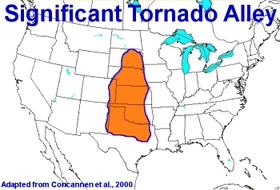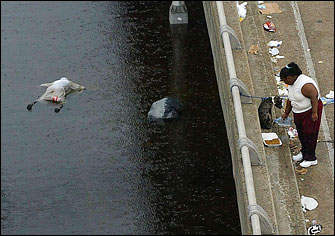 Kansas Governor Kathleen Sebelius was complaining about the lack of Kansas National Guard people at home long before her state was struck by an F5 tornado last week:
Kansas Governor Kathleen Sebelius was complaining about the lack of Kansas National Guard people at home long before her state was struck by an F5 tornado last week:
"The Guard cannot train on equipment they do not have," Sebelius continued. "The more resources that are left behind, the less able our guardsmen are to prepare here at home. And in a state like Kansas, where tornados, floods, blizzards and wildfires can seemingly happen all at once, we need our Guardsmen to be as prepared as possible." — Kathleen Sebelius, Feb. 27, 2007
And she hasn’t been the only one complaining that the Iraq War has drained state of their emergency response services:
GAO Report, January 2007
“The high use of the National Guard for federal overseas missions has reduced equipment available for its state-led domestic missions, at the same time it faces an expanded array of threats at home.” [GAO, “Reserve Forces: Actions Needed to Identify National Guard Domestic Equipment Requirements and Readiness,” January 2007]Lt. Gen. H. Steven Blum, Chief, National Guard Bureau
“They (the governors) are rightfully concerned that while the personnel part of the Guard has never been better, never been more ready, the equipment piece to the National Guard back here at home has never been less ready, and they are trying to resolve that obvious disconnect…The message is clear: What we have in the budget does not produce the level of readiness that they feel comfortable with.” [Stateline.org; 2/25/07]North Carolina Governor Michael Easley, Co-lead on National Guard issues for the National Governors Association: “We the governors rely on the Guard to respond to natural disasters, a pandemic or terrorist attack…Currently, we don’t have the manpower or the equipment to perform that dual role” of responding to both state and federal needs. [Los Angeles Times, 2/25/07]
Maj. Gen. Arnold Punaro, Chairman of the Commission on the National Guard and Reserves: “Well, right now, we’re not prepared. We are not prepared for the threats this nation faces here at home. And because in this business you can’t be half-ready or half-prepared, you’re either ready or you aren’t.” [PBS, NewsHour, March 1, 2007]
Maj. Gen. R. Martin Umbarger, Head of the Indiana National Guard: “What keeps me up at night is, I think I am able to surge . . . for the normal disaster, but if I needed to deploy every bit of my soldiers and airmen, I know for a fact I do not have enough equipment.” [Washington Post, 3/2/07]
Lt. Col. Pete Schneider, Spokesman for the Louisiana National Guard: “We are really concerned about vehicles…We would have enough for a small-scale issue . . . maybe a Category 1 tropical storm we could handle — an event that doesn’t involve massive flooding or massive search and rescue.”[Washington Post, 3/2/07]
Col. Robert Simpson, Director of the Joint Staff for the Virginia National Guard: In the event of “a very large . . . chemical, biological or nuclear incident in the national capital region, I would need every truck I was authorized, and we don’t have that…We are definitely short trucks, all wheeled vehicles,” as well as radios, bulldozers and other gear. [Washington Post, 3/2/07]
To add to that:
- The Iraq war has crippled Florida’s ability to respond to hurricanes. "With hurricane season approaching, Floridians want the National Guard to have everything it needs to respond quickly and effectively to natural disasters. But the Iraq war’s drain on personnel and equipment is forcing the Guard to work overtime to stay prepared. The Florida National Guard began the year with only about 25 percent of the authorized equipment it should have on hand, down by half from before the invasion of Iraq in March 2003." (Palm Beach (FL) Post, 3/25/07)
- Massive equipment shortfalls hinder the Oklahoma National Guard. "’We’re behind the power curve, and we can’t piddle around,’ Maj. Gen. Harry M. Wyatt III, commander of the Oklahoma National Guard, said in an interview. He added that one-third of his soldiers lacked the M-4 rifles preferred by active-duty soldiers and that there were also shortfalls in night vision goggles and other equipment. If his unit is going to be sent to Iraq next year, he said, ‘We expect the Army to resource the Guard at the same level as active-duty units.’" (New York Times, 2/22/07)
- Oklahoma National Guard troops are facing the longest deployment since the Korean War. "About 3,500 members of the Oklahoma National Guard could be sent to Iraq as early as January 2008, military officials said Wednesday. The deployment – which would be the largest for the Oklahoma National Guard since the Korean War – more likely will be in the summer of 2008, officials said. Initial plans for the 45th called for a rotation in the year 2010,’ Wyatt said. ‘We have been accelerated two years.’" (Oklahoman (Oklahoma City, OK), 2/1/07)
- The Michigan National Guard is under-equipped. "Michigan’s Army National Guard units have only about 40 percent of their assigned equipment, reflecting nationwide equipment shortages the country’s top National Guard officer has called ‘unacceptable.’ The shortages of trucks, helicopters and other equipment – a result of the strains of the Iraq war – mean Guard units are less prepared to respond to state disasters. ‘We are now in a degraded state back here at home,’ said Lt. Gen. Steven Blum, the National Guard’s top officer. ‘The ability for the National Guard to respond to natural disasters and to perhaps terrorist weapons-of-mass-destruction events that may come to our homeland is at risk because we are significantly under equipped.’" (Detroit News, 3/31/07)
- Oregon Guard short $103 million worth of equipment, 66% short on weapons and vehicles. "Oregon’s National Guard units are short more than $100 million worth of equipment, largely because five years of deployments have depleted weapons and vehicle stocks… Much of that equipment was damaged or destroyed in Iraq and Afghanistan, Caldwell said, and some was left behind for other troops to use. Back home, the lack of equipment makes Guard training and response to emergencies more difficult, he said. Caldwell estimates that Oregon’s Guard units have about 44 percent of the weapons, vehicles and other equipment they are supposed to have. It would cost $103 million to replace the ‘most important’ of what’s been lost or left behind, he said." (Portland Oregonian, 3/2/07)
- New Mexico National Guard troops are drastically unequipped. "Among other things, that letter says helicopter evacuation crews from the New Mexico Guard were forced to remove medical equipment from their older-model helicopters to make them light enough to fly during one recent deployment. New Mexico’s non-deployed Guard units rank last in the country in equipment readiness, the letter states. [Brigadier General Kenny] Montoya said equipment issues have long been a problem for the Guard, which is funded by the federal government. ‘We’re looking at 30 years of mismanagement of the National Guard, and that’s not going to get fixed overnight.’" (Albuquerque Tribune, 3/14/07)
- Many Arkansas National Guard soldiers lack the equipment they need. "Capt. Christopher Heathscott, a spokesman for the Arkansas National Guard, said the state’s 39th Brigade Combat
 Team was 600 rifles short for its 3,500 soldiers and also lacked its full arsenal of mortars and howitzers. Of particular concern, he said, is the possibility that the prospects of going to Iraq next year could cause some Arkansas reservists not to re-enlist this year. Over the next year roughly one-third of the soldiers in the 39th will have their enlistment contracts expire or be eligible for retirement, Captain Heathscott said." (New York Times, 2/22/07)
Team was 600 rifles short for its 3,500 soldiers and also lacked its full arsenal of mortars and howitzers. Of particular concern, he said, is the possibility that the prospects of going to Iraq next year could cause some Arkansas reservists not to re-enlist this year. Over the next year roughly one-third of the soldiers in the 39th will have their enlistment contracts expire or be eligible for retirement, Captain Heathscott said." (New York Times, 2/22/07)
And this is where we stand after Katrina, in which Bush (supposedly) learned the importance of state and federal assistance to disasters.

